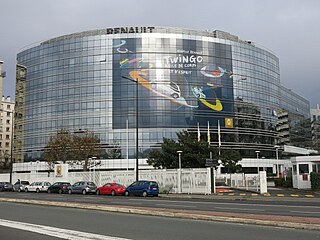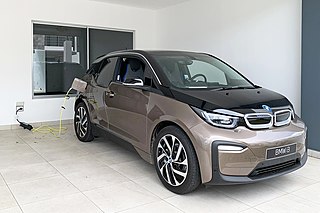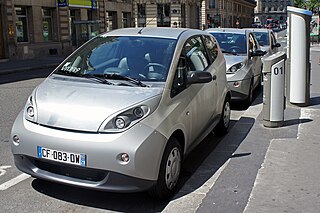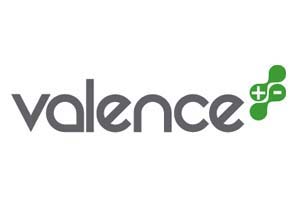Related Research Articles

Groupe Renault is a French multinational automobile manufacturer established in 1899. The company produces a range of cars and vans and in the past, has manufactured trucks, tractors, tanks, buses/coaches, aircraft and aircraft engines, and autorail vehicles.

An electric vehicle (EV) is a vehicle that uses one or more electric motors for propulsion. The vehicle can be powered by a collector system, with electricity from extravehicular sources, or can be powered autonomously by a battery or by converting fuel to electricity using a generator or fuel cells. EVs include road and rail vehicles, electric boats and underwater vessels, electric aircraft and electric spacecraft.

The Renault Kangoo is a family of vans built by Renault since 1997 across three generations. It is sold as a passenger multi-purpose vehicle or as a light commercial vehicle. For the European market, the Kangoo is manufactured at the MCA plant in Maubeuge, France.

A Neighborhood Electric Vehicle (NEV) is a U.S. category for battery electric vehicles that are usually built to have a top speed of 25 miles per hour (40 km/h), and have a maximum loaded weight of 3,000 lb (1,400 kg). Depending on the particular laws of the state, they are legally limited to roads with posted speed limits of 35 miles per hour (56 km/h) or less. NEVs fall under the United States Department of Transportation classification for low-speed vehicles. The non-electric version of the neighborhood electric vehicle is the motorized quadricycle.

An electric truck is a battery electric vehicle (BEV) designed to transport cargo, carry specialized payloads, or perform other utilitarian work.

The Bolloré Bluecar is a small four-seat, three-door electric car supplied by Bolloré, designed by Pininfarina and manufactured by Cecomp in Bairo, Italy, under a joint venture owned by Bolloré and Pininfarina called Véhicule Électriques Pininfarina Bolloré (VEPB). The car has a 30kWh lithium metal polymer (LMP) battery, coupled to a supercapacitor, that provides an electric range of 250 km (160 mi) in urban use, and a maximum speed of 120 km/h (75 mph).

Valence Technology, Inc. was a company that developed and manufactured lithium iron phosphate cathode material as well as lithium ion battery modules and packs. The modules come in 12 V, 18 V, 24 V, and 36 V configurations. Valence's products are used in electric vehicle and plug-in hybrid electric vehicles (PHEVs) such as cars, scooters, motorbikes, and commercial vehicles such as buses, delivery vans and trucks. Valence batteries are also used in wheelchairs, medical carts, robotics, marine, rail, as well as stationary applications such as remote power, uninterruptible power supply (UPS), energy storage systems, frequency regulation and switching gear.

A battery electric vehicle (BEV), pure electric vehicle, only-electric vehicle, fully electric vehicle or all-electric vehicle is a type of electric vehicle (EV) that exclusively uses chemical energy stored in rechargeable battery packs, with no secondary source of propulsion. BEVs use electric motors and motor controllers instead of internal combustion engines (ICEs) for propulsion. They derive all power from battery packs and thus have no internal combustion engine, fuel cell, or fuel tank. BEVs include – but are not limited to – motorcycles, bicycles, scooters, skateboards, railcars, watercraft, forklifts, buses, trucks, and cars.

The Renault Zoe, known as Renault Zoe E-Tech Electric since 2021, is a five-door supermini electric car produced by the French manufacturer Renault. Renault originally unveiled, under the Zoe name, a number of different concept cars. Initially in 2005 as the Zoe City Car and later as the Zoe Z.E. electric concept was shown in two different versions in 2009 and 2010 under the Renault Z.E. name. A production ready version of the Zoe was shown at the 2012 Geneva Motor Show. The Renault Zoe is based on the platform of the Renault Clio.
Dana TM4, previously known as TM4 Inc., is a joint-venture between Dana Corporation and government-owned public utility Hydro-Québec. Established in 1998, it is active in the development of electric vehicle motors and related power systems. After spinning-off from Hydro-Québec's research center to commercialize their electric powertrain technologies, TM4 encountered some success in the 2000s, participating in many short-lived OEM demonstration programs. Commercially, things began to take-off in the 2010s, especially after they diversified their product ranges to serve the commercial vehicle market. As of 2018, thousands of electric and hybrid vehicles were equipped with TM4 systems.

The Renault Fluence Z.E. is an electric version of the Renault Fluence compact sedan, part of the Renault Z.E. program of battery electric vehicles. It was unveiled by Renault at the 2009 Frankfurt Motor Show. The Fluence Z.E. is outfitted with a 22 kWh lithium-ion battery which allows a total all-electric range of 185 km (115 mi) measured on the NEDC combined cycle, with speeds up to 135 km/h (84 mph).

The Renault Twizy is a two-seat electric microcar designed and marketed by Renault. It is classified in Europe as either a light or heavy quadricycle depending on the output power, which is either 4 kW (5.4 hp) for the 45 model or 13 kW (17 hp) for the 80 model, both names reflecting its top speed in km/h. Originally manufactured in Valladolid, Spain, production was moved to Busan in South Korea in March 2019 to meet increased demand in Asia. In July 2023 it was announced that production of the Twizy was to end in September 2023; it is to be replaced by the new Mobilize Duo.

The Oreos 2X is a 22-place electric low-floor minibus of the Gepebus line, made by Power Vehicle Innovation. The Oreos 2X is among the first electric vehicles of this kind to be produced in France. Entirely electric, this minibus lowers the environmental impact of transport for local authorities or private actors in need of this kind of vehicle.

The Oréos 4X is a 49-places electric midibus of the Gepebus' line of products, from Power Vehicle Innovation. Made for the operating of some urban regular lines, or also a private usage, the Oreos 4X is among the first entirely electric autobuses produced in France. This clean vehicle belongs to a new generation, more efficient for the power than the older models, and therefore helps to reduce the environmental impact of the transport in the cities.

Gépébus is a trademarked private sector brand name for electric autobuses made by Power Vehicle Innovation for use in mass public transportation.
The Lion Electric Company, is a Canadian-based manufacturer of commercial vehicles. Currently the biggest electric vehicle manufacturer in its segment, Lion primarily produces yellow school buses, public transit buses, semi-trucks, bucket trucks, and garbage/refuse trucks.

The adoption of plug-in electric vehicles in the France is actively supported by the French government through a bonus–malus system through which provides subsidies towards the purchase of all-electric vehicles and plug-in hybrids with low CO2 emissions. The government also provides non-monetary incentives; subsidies for the deployment of charging infrastructure; and long term regulations with specific targets. Additionally, France passed a law in December 2019 to phase out sales of cars that burn fossil fuels by 2040.
References
- ↑ "Bus et navettes électriques - Actualités en France et dans le monde". Avem.fr. Retrieved 2015-02-27.
- ↑ "Focus on WATT® System - PVI, leader de la traction électrique pour véhicules industriels". Pvi.fr. Archived from the original on 2014-07-14. Retrieved 2015-02-27.
- ↑ "Nice: a fully electric bus with unlimited range". Investincotedazur.com. 2014-06-24. Archived from the original on 2014-11-11. Retrieved 2015-02-27.
- ↑ "Frederiksbergs skraldemænd vil helst køre på el". Ingeniøren . 24 February 2017. Retrieved 24 February 2017.
- ↑ "MAXITY ELECTRIC - News - News & Opportunities". Renault Trucks. Retrieved 2015-02-27.